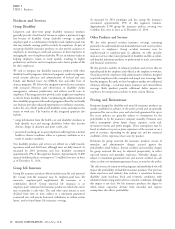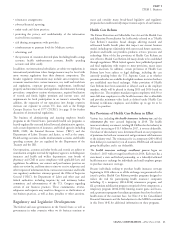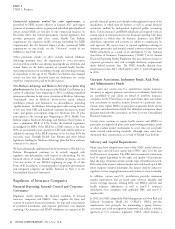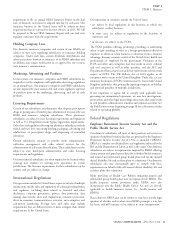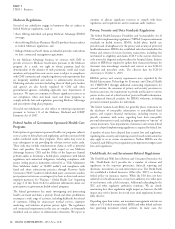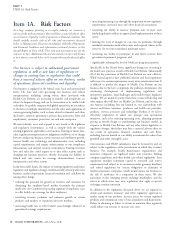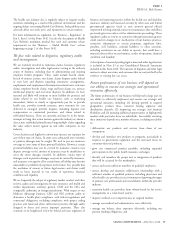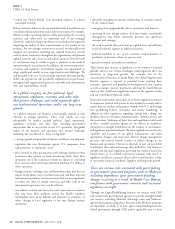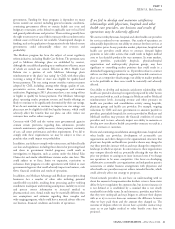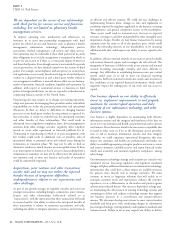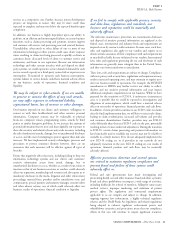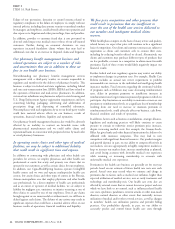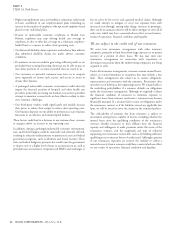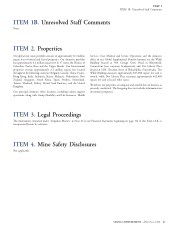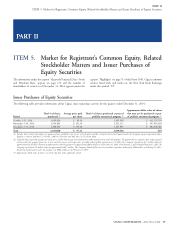Cigna 2014 Annual Report Download - page 52
Download and view the complete annual report
Please find page 52 of the 2014 Cigna annual report below. You can navigate through the pages in the report by either clicking on the pages listed below, or by using the keyword search tool below to find specific information within the annual report.PART I
ITEM 1A. Risk Factors
reduce our Global Health Care operating expenses to achieve effectively managing our partner relationships in countries outside
sustainable benefits. of the United States;
If these initiatives fail or are not executed effectively, it could harm our managing more geographically diverse operations and projects;
consolidated financial position and results of operations. For example, operating in new foreign markets that may require considerable
efforts to reduce operating expenses while maintaining the necessary management time before operations generate any significant
resources and talent pool are important and, if not managed revenues and earnings;
effectively, could have long-term effects on our business by negatively
impacting our ability to drive improvements in the quality of our the need to provide data protection on a global basis and sufficient
products. For our strategic initiatives to succeed, we must effectively levels of technical support in different locations;
integrate our operations, including our acquired businesses, actively political instability or acts of war, terrorism, natural disasters or
work to ensure consistency throughout the organization, and promote pandemics in locations where we operate; and
a global mind-set and a focus on individual customers. If we fail to do
so, our business may be unable to grow as planned, or the result of general economic and political conditions.
expansion may be unsatisfactory. In addition, the current competitive, These factors may increase in significance as we continue to expand
economic and regulatory environment requires our organization to globally, and any one of these challenges could negatively affect our
adapt rapidly and nimbly to new opportunities and challenges. We operations or long-term growth. For example, due to the
will be unable to do so if we do not make important decisions quickly, concentration of business in South Korea, the Global Supplemental
define our appetite for risk specifically, implement new governance, Benefits segment is exposed to potential losses resulting from
managerial and organizational processes smoothly and communicate economic, regulatory and geopolitical developments in that country,
roles and responsibilities clearly. as well as foreign currency movements affecting the South Korean
currency, that could have a significant impact on the segment’s results
As a global company, we face political, legal,
and our consolidated financial results.
operational, regulatory, economic and other risks
International operations also require us to devote significant resources
that present challenges and could negatively affect
to implement controls and systems in new markets to comply, and to
our multinational operations and/or our long-term
ensure that our vendors and partners comply, with U.S. and foreign
growth.
laws prohibiting bribery, corruption and money laundering, in
addition to other regulations regarding, among other things, our
As a global company, our business is increasingly exposed to risks
products, direct-to-consumer communications, customer privacy and
inherent in foreign operations. These risks, which can vary
data protection. Violations of these laws and regulations could result
substantially by market, include political, legal, operational,
in fines, criminal sanctions against us, our officers or employees,
regulatory, economic and other risks, including government
restrictions or outright prohibitions on the conduct of our business,
intervention that we do not face in our U.S. operations. The global
and significant reputational harm. We must regularly reassess the size,
nature of our business and operations may present challenges
capability and location of our global infrastructure and make
including, but not limited to, those arising from:
appropriate changes, and must have effective change management
varying regional and geopolitical business conditions and demands; processes and internal controls in place to address changes in our
business and operations. Our success depends, in part, on our ability
regulation that may discriminate against U.S. companies, favor
to anticipate these risks and manage these difficulties. Our failure to
nationalization or expropriate assets;
comply with laws and regulations governing our conduct outside the
price controls or other pricing issues and exchange controls or other United States or to establish constructive relations with non-U.S.
restrictions that prevent us from transferring funds from these regulators could have a material adverse effect on our business, results
operations out of the countries in which we operate or converting of operations, financial condition, liquidity and long-term growth.
local currencies that our foreign operations hold into U.S. dollars or
other currencies;
There are various risks associated with participating
foreign currency exchange rates and fluctuations that may have an
in government-sponsored programs, such as Medicare,
impact on the future costs or on future sales and cash flows from our
including dependence upon government funding,
international operations, and any measures that we may implement
changes occurring as a result of Health Care Reform,
to reduce the effect of volatile currencies and other risks of our
compliance with government contracts and increased
international operations may not be effective;
regulatory oversight.
our reliance on local sales forces for some operations in countries Through our Cigna-HealthSpring business, we contract with CMS
that may have labor problems and/or less flexible employee and various state governmental agencies to provide managed health
relationships that can be difficult and expensive to terminate, or care services, including Medicare Advantage plans and Medicare-
where changes in local regulation or law may disrupt business approved prescription drug plans. Revenues from Medicare programs
operations; are dependent, in whole or in part, upon annual funding from the
federal government through CMS and/or applicable state or local
20 CIGNA CORPORATION - 2014 Form 10-K
••
•
•
•
•
•
•
•
•
•
•


